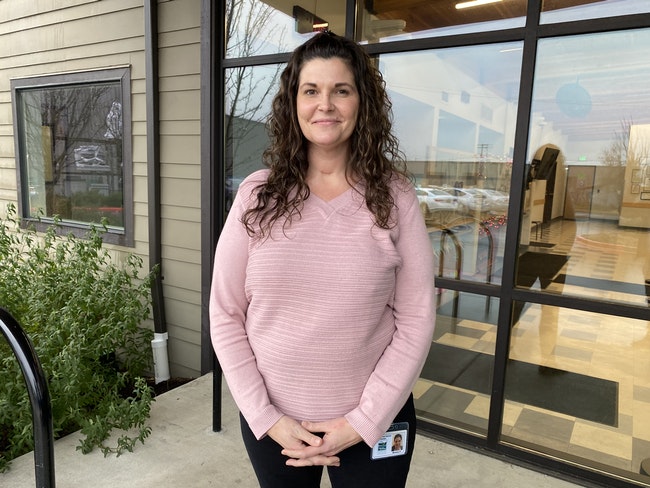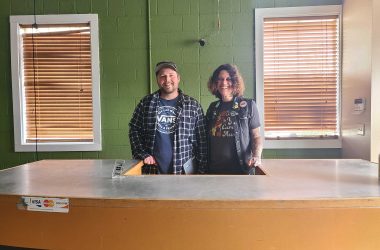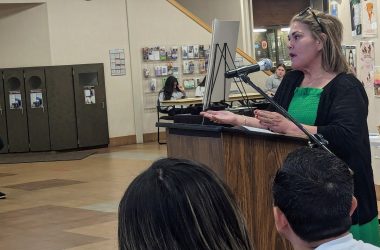
Melissa Pola (Ardeshir Tabrizian/Salem Reporter)
When Melissa Pola first walked into Her Place in Salem on Nov. 23, 2011, she dropped to her knees and started crying.
After spending seven months in jail and enduring two decades of addiction, she’d found a place where she could start recovery and get back her kids, who were in the state’s custody.
“I had tried so hard to get to that spot and finally be there,” Pola, 45, said. “Every day before that’s just been this vicious cycle of just trying to get my basic needs met while I’m trying to get to my kids, and it’s just a nightmare.”
Now a drug and alcohol counselor at Her Place, she’s spent the past three years helping other women in Salem recover from their addictions.
Her Place is a transitional living program that provides onsite treatment, transportation, childcare and food for women who have children or are pregnant.
For the women she works with at Her Place, Pola said learning about her journey gives them hope. “This is the one thing I hear the most: ‘If you can do it, we can do it.’”
Pola grew up in West Linn. Her parents divorced when she was four years old and both battled addictions and alcoholism. She lived with her mom until she was 12. Then, she she moved to Salem to live with her father.
Twelve was also the age Pola started smoking cigarettes and marijuana. By 14, was using methamphetamine. At 16, she moved out.
She said she now recognizes she was afflicted by trauma she didn’t know she had then.
“I thought that my mother and father’s divorce had never impacted me. As I continue to do my work on my own recovery, that’s obvious to me that it did impact me right when I was that age,” she said. “I think I was always trying to fill a black hole.”
Pola said she thought her early drug use was normal because she grew up around it. Still, she was careful to hide it from her classmates, an effort that carried on into adulthood.
“I was lying to everybody,” she said, and there was no sober time in her life except during her pregnancies.
Pola, her two oldest children and their father moved in 2002 to Wyoming, where his mother was living. Hoping to distance themselves from their group of friends in Oregon and recover from their addictions, they saw Wyoming’s oil industry as an opportunity to make money.
After the pair split, she enrolled at Western Wyoming Community College in 2004, where she studied geology and archaeology and got to travel the world for archaeological digs, but didn’t finish her degree. She was still using privately, and her addiction was catching up to her.
She moved back to Oregon and got a job as a bartender, “which was probably the worst move I could have made for myself,” she said. “It just escalated me to vault right back to where I had left Oregon, hanging out with the same people doing the same things, which led to (state Department of Human Services) involvement with my older children.”
She’s currently reconnected with her two oldest kids – a 24-year-old daughter and 23-year-old son – and nine-year old daughter, and she has a 21-year-old stepdaughter.
But previously in 2009, around two years after she returned from Wyoming to Oregon, DHS took custody of her two older kids and placed them in foster care with her sister for around a year before their dad got out of prison, and they moved in with him in Wyoming.
Pola was homeless from the time DHS took her children to when she started her jail sentence.
“I was unable to contact them or talk to them,” she said of her kids. “I’m trying to maneuver getting off of the streets while I have all of this guilt and the shame and the anxiety and this fear of the unknown, where my kids are. That trauma is just all consuming. It becomes like your own private living hell that you get trapped in and it’s just so hard to overcome.”
Homeless and pregnant with her third child, Pola stayed sober and couch surfed. There were nights when I couldn’t find a place to stay, and that’s why I would break into cars that had covers on them to stay warm because towards the end of my pregnancy it was the winter,” she said. “I was just trying to keep my stomach warm.”
Also hanging over her head were pending criminal charges for theft. “I had a crazy notion in my head that if I could shoplift enough stuff, because I had somebody that would buy it, that I could get enough money, maybe even $1,500, to go to Wyoming and try to find my kids,” she said.
The charges prompted DHS to remove third and youngest child at the hospital and place her to live with Pola’s younger sister.
Pola immediately left the hospital with her older sister, who took her to Marion County’s Addiction Treatment Services building where she signed up for drug treatment.
But six days after Pola left the hospital, she was sentenced to seven months in jail.
When she was at the jail’s work center – where people in custody are released during the day to work, get treatment or have appointments with DHS – she noticed a pegboard with a flyer for Her Place.
“I kept calling and calling, and my parole officer helped me to get into Her Place and finish my sentence there,” she said. “When I got to Her Place, that’s when my life really started changing.”
Supervisor Teri Morgan said the average stay at Her Place is six months. “We don’t discharge anybody until we know they have safe and stable housing to go to, so we work with multiple agencies and providers,” Morgan said.
Pola said Her Place provided her a setting where “it was okay to fall apart,” and she had the resources to pick herself back up and redesign her life.
“You can’t do that out there without these things,” she said. “Having that house to walk into and knowing I was safe there and welcome there, that was everything I’d been trying to find.”
Morgan and Pola recall one day when they were unloading supplies in the driveway of Her Place, and Pola told Morgan she wanted to work for her one day.
“Okay, do it,” Pola recalled Morgan telling her.
“I’ve never known what I wanted to do with my life,” Pola said. “I was always kind of wandering and lost. I just knew that I was going to help other women no matter how that was.”
Pola left Her Place after five and a half months and her DHS caseworker helped get her a family reunification voucher, which allowed her to get an apartment for her and her now nine-year-old daughter.
When she left Her Place, she had already enrolled in classes at Chemeketa Community College. There, she was in the addiction studies program until 2015 to prepare to become a certified addictions counselor. She got her bachelor’s degree from Corban University. Now she’s working toward getting her master’s degree in social work from Portland State University.
Pola started working for Marion County in 2016 as a drug and alcohol counselor at the Medication-Assisted Treatment Program, an outpatient program for people with opiate addictions, before she found herself back at Her Place.
Her work shift now begins with her making sure the women who live there are on board with their daily schedule and checking if they need rides anywhere. After they have breakfast and do chores, Pola has one-on-one and group sessions with them as part of her case management of both the women living there and outpatient clients.
“I keep my door open most of the day unless I’m in a one-on-one, and there are a lot of times the women come in and they just want to process things,” she said. “They want to get direction and guidance on what they should do next. They want to talk about their babies. They want to talk about how to reconnect with family members and rebuild those relationships.”
Pola said the most successful days are when she can help teach skills others can use instead of using drugs or alcohol. “Anything I can do that leads to their independence as a woman, as a parent, I think is a good day for me,” she said.”
The toughest part of her job, she said, is allowing people to not be ready for recovery. “Sometimes it’s just their choice to not be ready and I have to be okay with that. I have to know when to help and when to let them step away, and that’s a gray area you have to get used to working in,” she said.
Since Pola first arrived at Her Place in 2011 when she was in recovery, she said she hit the ground running.
Pola has owned a home for the past four years and has been engaged for the past seven.
The couple is thinking about getting married in September.
Pola said she wants to spend the rest of her career working to help people in the community. “(Staff) typically don’t ever want to leave Her Place, I’m one of those people. As long as I’m helping individuals in this community to achieve health and overcome their addiction, I’m right on the route that I want to be.”
Contact reporter Ardeshir Tabrizian: [email protected] or 503-929-3053.
JUST THE FACTS, FOR SALEM – We report on your community with care and depth, fairness and accuracy. Get local news that matters to you. Subscribe to Salem Reporter starting at $5 a month. Click I want to subscribe!









